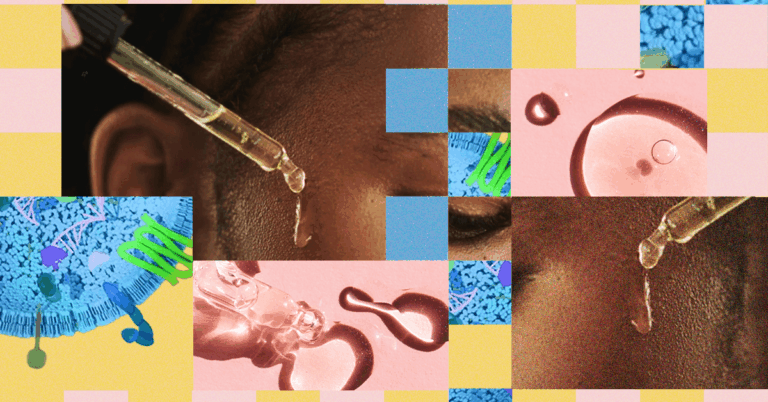By now, you’ve in all probability seen “exosomes” wafting throughout your For You web page, perhaps sandwiched between a promo code for snail mucin and somebody rendering beef tallow. Scroll by means of SkinTok lengthy sufficient and also you’ll hit a flood of videos hyping exosome remedy, exosome serums, and exosome remedies promising the pores and skin well being of a cherub.
Skincare corporations have seized the time period. Marketed as miraculous regenerative brokers, you’ll discover them on $300 facial menus, in post-micro-needling procedures, and throughout influencers’ skin-care routines.
TikTok content material
This content material can be seen on the positioning it originates from.
What Are Exosomes?
An exosome is a teeny sac inside a cell, or what a scientist may name an extracellular vesicle. They act as tiny mailbags, shuttling mRNAs, lipids, and different genetic materials by means of the cell membranes from one cell to a different.
Exosomes are part of the physique’s inside messaging system, regulating all the things from cell development to hormone manufacturing and gene expression. They’re microscopic, measuring about 40 to 100 nanometers across, so small they make a crimson blood cell look large compared. Scientists first found them underneath a microscope again within the Sixties, however they didn’t acquire vital consideration till the early 2000s.
Why Are Exosomes Controversial?
In drugs, exosomes are being studied for cancer therapies, neurodegenerative ailments, and drug delivery systems. As a result of they mirror the state of the cells from which they originate, most cancers cells usually launch exosomes that include distinctive molecular fingerprints. Scientists are already utilizing these biomarkers to help within the early analysis of circumstances like prostate most cancers. The potential for early, noninvasive detection throughout a variety of ailments is substantial.
As a result of exosomes can cross organic obstacles and ship cargo, researchers are additionally exploring them as autos for focused medication. Moreover, they maintain potential for wound therapeutic, irritation discount, and tissue regeneration.
Naturally, the wonder business caught wind. Now, exosomes are in moisturizers, serums, and hair injectables, promising to restore your pores and skin barrier, enhance collagen manufacturing, and reverse getting old.
TikTok content material
This content material can be seen on the positioning it originates from.
However right here’s the place it will get murky. Most printed scientific research on exosome skincare are small-scale or lack rigorous controls. Exosomes, in contrast to prescription drugs, don’t have any fastened composition or standardized dosing, they usually lack good manufacturing practices (GMPs). This variability makes affected person outcomes laborious to foretell. And their contents might shift from batch to batch. Sources additionally fluctuate—from mesenchymal stem cells and platelets to plant cells and umbilical twine tissue.
“Not all exosomes are the identical,” says Jodi Gurney, cofounder of Exotropin, a skin-care model promoting what they name exoceuticals. “The supply, manufacturing course of, and cargo all decide how efficient they’re.”
“There’s at present no know-how that permits producers to place exosomes right into a bottle, put it on a shelf, and maintain them from degrading,” says Jimmy Sung, a board-certified plastic and reconstructive surgeon specializing in regenerative aesthetics. “Even when they are saying, ‘We put x quantity in,’ there’s no solution to confirm what number of stay lively. And so they gained’t put that in writing or testify to it underneath oath.”
If corporations had been to purify exosomes to pharmaceutical-grade requirements, they’d have to classify them as medication. Many mix them with conventional skin-care elements like hyaluronic acid or vitamin C to skirt that. This additionally signifies that if customers are noticing optimistic outcomes, it could be as a result of components (not the alleged exosomes).
Are They Protected?
Exosomes aren’t stay cells, so that they carry much less threat than stem cell therapies. Nonetheless, they’re biologically lively, that means that contamination is a severe concern. Improper purification can lead to merchandise that include undesirable cargo: viral miRNAs, immunosuppressive brokers, and tumor-growth components (to call just a few).
“I personally keep away from utilizing non-autologous exosomes in my apply except I can completely vet the product’s origin, security information, and mechanism of motion,” Hannah Kopelman, a dermatologist specializing in hair and scalp problems, writes in an e-mail to WIRED. “The U.S. Food and Drug Administration has issued warnings in regards to the misuse of unapproved exosome merchandise, and as a practitioner, that raises a crimson flag. I can’t in good conscience supply a product I wouldn’t use on myself or my circle of relatives except I’m totally assured.”

